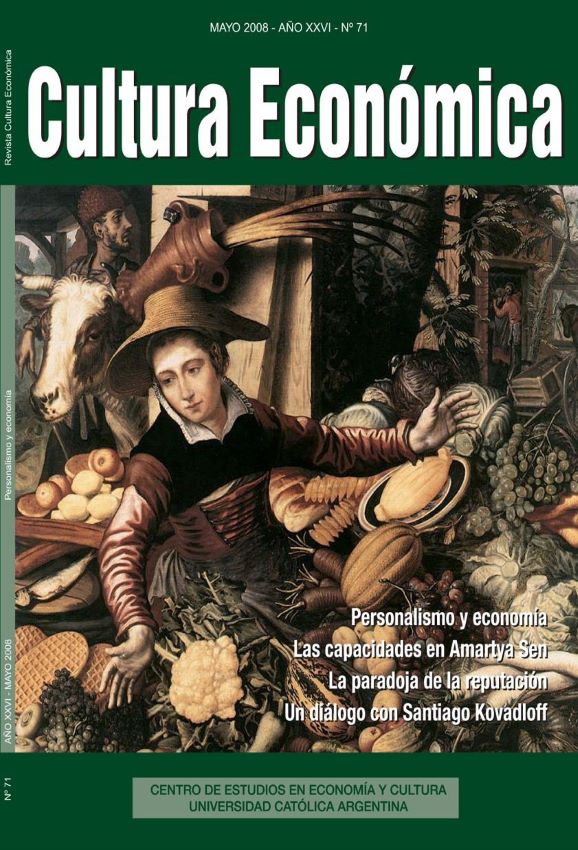The paradox of good reputation
Keywords:
reputation, integrity, maximization of profit, enlightened selfinterestAbstract
This article is an attempt to reinterpret “The Ethics of the Management Paradox” as it is formulated by the Leuven philosopher-economist Luk Bouckaert (2006) who analyses how to make business ethics operational and how to make business genuinely ethical. The question becomes to what extent ethical behavior constituting a good reputation can be “used” by corporate managers to enhance corporate value. In line with Bouckaert’s paradox, Peter Verhezen argues that instrumentalizing reputation would possibly undermine its objectives to achieve useful benefits.
Downloads
References
Badaracco, J. L. Jr. (1997), Defining Moments. When managers must choose between right and right, Harvard University Press, Boston.
Badaracco, J. L. Jr. (2002), Leading Quietly. An Unorthodox Guide to Doing the Right Thing, Harvard Business School Press, Boston MA.
Banks, E. (2004), Corporate Governance. Financial Responsibility, Controls and Ethics, Palgrave MacMillan, Londres.
Barnet, M., Jermier, J. y Lafferty, B. (2006), “Corporate Reputation: the definitional landscape”, Corporate Reputation Review, Vol.9, pp. 26-38.
Bouckaert, L. (2006), “The Ethics Management Paradox”, en Znolsnai, L. Interdisciplinary Yearbook of Business Ethics, Kluwer Publications, Boston - Dordrecht - London.
Calhoun, C. (1995), “Standing for Something”, The Journal of Philosophy, Vol XCII, no5, pp. 235-260.
Carter, S. (1996), Integrity, HarperCollins Publishers, Nueva York.
Cloud, H. (2006), Integrity. The courage to meet the demands of reality, Collins, Nueva York.
Comte-Sponville, A. (2004), Le Capitalisme est-il mora?, Livre de Poche, París.
Cox, D., La Caze, M. y Levine, M. (2003), Integrity and the fragile self, Ashgate, Hants.
Davies, G., Chun R., Vinhas da Solva, R. y Roper, S. (2003), Corporate Reputation and Competitiveness, Routledge Publications, Londres - Nueva York.
Dawes, R. y Thaler, R. (1988), “Cooperation”, Journal of Economic Perspectives, Vol 2, No 3.
Dowling, Gr. (2006), “In Practice: How Good Corporate Reputations Create Corporate Value”, Corporate Reputation Review, Vol.9, No.2, pp. 134 -143.
Drucker, P. F. (1973), Management: Task, Responsibilities and Practices, Harper & Row, Nueva York.
Fombrun, C. y Foss, C. (2004), “Business Ethics: Corporate Responses to Scandal”, Corporate Reputation Review, Vol.7, No.3, pp. 284-288.
Frank, R. (1990), “A Theory of Moral Sentiments”, en Mansbridge, J. (ed.), Beyond Self-interest, Chicago Univ Press, pp. 71-96, Chicago.
Habermas, J. (1998), The Inclusion of the Other. Studies in Political Theory, [1996, Die Einbeziehung des anderen. Studien zur politischen Theorie], The MIT Press, Boston MA.
Habermas, J. (2005), Truth and Justification, [1999, Wahrheit und Rechtfertigung], The MIT Press, Boston MA.
Hamphire, S. (1983), Morality and Conflict, Basil Blackwell, Oxford.
Hardin, R. (1993), “Altruism and Mutual Advantage”, Social Service Review, University of Chicago, pp. 3-61.
Kapstein, M. y Wempe, J. (2002), The Balanced Company. A Theory of Corporate Integrity, Oxford University Press, Oxford.
Karssing, E. (2006), Integriteit in de beroepspraktijk, Van Gorcum, Assen.
Kennedy-Glans, D. y Schulz, B. (2005), Corporate integrity. A Toolkit for managing beyond compliance, John Wiley & Sons, Ontario.
Koehn, D. (2005), “Integrity as a Business Asset”, Journal of Business Ethics, Vol. 58: 125-136.
Larkin, J. (2003), Strategic Reputation Risk Management, Palgrave MacMillan, Nueva York.
Macmillan, K., Money, K., Downing, S. y Hillenbrand, C. (2005), “Reputation in Relationships: Measuring Experience, Emotions and Behaviors”, Corporate Reputation Review, Vol.8, No.3: 214-232.
Martin, R. (2007) “How successful leaders think”, Harvard Business Review, Junio, pp. 60-69.
McFall, L. (1987), “Integrity”, Ethics, 98, pp. 5-20.
Moeller, R. (2004), Sarbanes-Oxley and the new internal Auditing Rules, Wiley & Sons, New Jersey.
Paine, L. S. (1994), “Managing for Organizational integrity”, Harvard Business Review, Vol 72: 106-117, Boston MA.
Paine, L. S., (2003), Values Shift, McGrawHill, Nueva York.
Sisodia, R., Sheth, J. y Wolfe, D. (2007), Firms of Endearment. How World-Class Companies Profit from Passion and Purpose, Wharton
School Publishing, New Jersey.
Rossouw, G. J. (2006), “A response to Bouckaert’s Ethics Management Paradox”, en Zsolnai, L. Interdisciplinary Yearbook of Business Ethics, Kluwer, pp. 208-210.
Srivastva, S. (ed.) (1988), Executive Integrity. The Search for High Human Values in Organizational Life, Jossey-Bass Publishing, San Francisco - Londres.
Van Luijk, L. (2004), “Integrity in the Private, the Public, and Corporate Domain”, en Brenkert, G. G. (ed.), Corporate integrity
and Accountability, Sage Publications, pp. 38-54, Londres.
Verhezen, P. (2004), “Integrity as good reputation”, Working Paper, Australian Centre for International Business, Melbourne University Press, Melbourne.
Verhezen, P. (2007), “The (ir)relevance of integrity in organizations”, Public Integrity, de pronta aparición.
Williams, B. (2002), Truth and Truthfulness, Princeton University Press, Princeton - Oxford.
Zohar, D. y Marshall, I. (2005), Spiritual Capital. Wealth we can live by, Bloomsbury Publications, Londres.
Zsolnai, L. (ed.) (2006), Interdisciplinary Yearbook of Business Ethics, Kluwer Publications, Boston - Dordrecht - London.
Downloads
Published
How to Cite
Issue
Section
License













